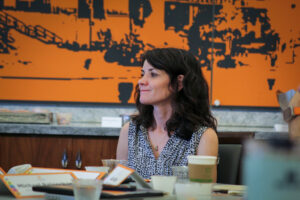
“I’m hoping we learn from each other about creative ways to implement new approaches and use the synergy of collaboration to develop more innovative approaches together.” – Robyn Brookshire, Clinical Assistant Professor, Child & Family Studies
The new cohort of Volunteer Experience Faculty Fellows recently gathered together to gain some wisdom and insight from the 2023 cohort and to share their thoughts and excitement for what’s ahead.
The Volunteer Faculty Fellow program is comprised of faculty across the university who are interested in engaging in well-being pedagogy for students and promoting well-being constructs amongst the faculty in their departments.
“The 2024-25 cohort of Volunteer Experience Faculty Fellows will continue the good work of recognizing our own and our peers’ classroom-based pedagogical efforts that support students’ well-being, and ultimately, students’ academic success,” said Sally Hunter, Volunteer Experience Faculty Director. “This coming year, we hope to pay special attention to our strengths, as well as ways that students’ well-being and faculty/instructor well-being intersect.” 
Directed through the Office of the Provost and coordinated through the Division of Student Success in partnership with Teaching and Learning Innovation (TLI), the Volunteer Experience Faculty Fellows program is central to UT’s Strategic Vision to promote student well-being and career readiness in all aspects of a student’s experience.
“When our scholars feel good both mentally and physically, they perform better academically,” says Amber Williams, Vice Provost for Student Success. “We firmly believe that creating a university culture that centers on and promotes well-being will bolster the overall success of our scholars while on Rocky Top, but it will also help to build the skills they need to thrive in their lives.”
The new Volunteer Experience Faculty Fellows cohort will help to build awareness of the importance of student well-being amongst their colleagues and respective colleges using a psychological framework called PERMA.
The structure promotes five building blocks of well-being—Positive Emotion, Engagement, Relationships, Meaning, and Accomplishment (PERMA), and there are strategies to increase each in the classroom.
Incoming fellow, Luca Giori, associate professor in Veterinary Medicine, shared how he plans to integrate PERMA in the classroom and his daily life.
“Through this fellowship, teaming up with other teachers who’ve got different backgrounds and views, I’m hoping to soak up some wisdom and perspectives that can help me change how we talk about my profession,” he says. “Instead of just focusing on the tough stuff and needing constant self-care, I want to shine a light on how dynamic and fulfilling veterinary work can be. Looking at it through the lens of positive psychology—focusing on engagement, growth, meaning, and accomplishments—will not only help my students and colleagues, but it’ll also boost my own well-being, because it’s totally in line with the PERMA model’s vibe.”
The outgoing group reflected on how they enjoyed their experience in the inaugural cohort and how participating allowed them to discover so many shared experiences amongst colleagues from different colleges.
Several also shared their PERMA strategies of what worked well in their classrooms, including making the class syllabus language sound more friendly and less technical, playing music at the beginning of class as students get settled to help create a welcoming space, balancing corrective edits with positive reinforcement, and focusing on one PERMA letter that felt most authentic to them personally.
Krystyne Savarese, Assistant Vice Provost, said working with the first cohort of the Volunteer Experience Faculty Fellows was a meaningful experience, and she’s excited for what’s ahead.
“Not only were they wholeheartedly committed to lifting the well-being of our scholars, but it was a joy to watch the community that they formed in the process,” she said. “We are excited to again focus on how we can foster faculty well-being as we collaborate to support our students.”